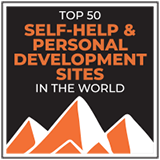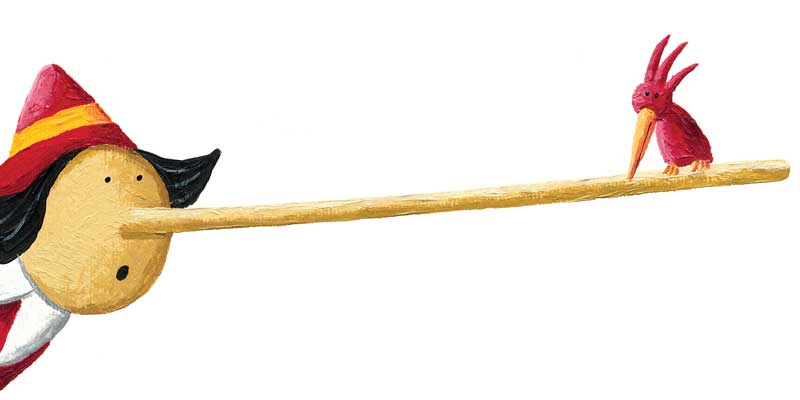The truth is . . . we can’t build relationships if we mistrust what friends say; we won’t follow leaders if we mistrust what they do; and we can’t make good decisions if we doubt the accuracy of the information that we receive. So why do people lie? The reasons are countless. Regardless of the motive, the ultimate results are the same. As someone once said, “The worst thing about being lied to is knowing you’re not worth the truth.”
Can You Spot a Lie?
Here are some common forms of dishonesty that masquerade as acceptable behavior:
Misrepresentation. Distorting facts to consciously mislead or create a false impression, spinning the truth, presenting opinion as fact, and using revisionist thinking or euphemisms to masquerade the truth are all forms of misrepresentation.
Omission. Leaving out key information to intentionally deceive someone. As Benjamin Franklin said, “Half the truth is often a great lie.”
Fabrication. Deliberately inventing an untruth or spreading a falsehood such as gossip or a rumor.
Exaggeration. Stretching the truth to give a more favorable impression.
Denial. Refusing to acknowledge the truth or to accept responsibility for a mistake or falsehood that was made.
Lack of transparency. Withholding information knowing that full disclosure will have negative consequences.
Redirection. Deflecting blame to another person to prevent personal embarrassment or responsibility.
False recognition. Stealing the credit for someone else’s hard-earned success.
Broken promise. Making a promise with no intention of keeping it.
Cover-up. Protecting the misdeeds of others. Those who provide cover for the misdeeds of others are as guilty as those who perpetrate the crime.
Hypocrisy. Saying one thing and consciously doing another. When words don’t match actions, someone is being dishonest with others or themselves.
Bait and switch. Attracting someone with an exciting offer only to divert them to an inferior deal.
Living a lie. Pretending that you are something you’re not.
Any way you cut it, when people distort the truth, they put their credibility at risk, while lowering their personal standards of honesty. There’s no excuse for dishonesty. None. As someone once said, “The truth doesn’t cost anything, but a lie could cost you everything.”
This is adapted from Follow Your Conscience: Make a Difference in Your Life & in the Lives of Others By Frank Sonnenberg © 2014 Frank Sonnenberg. All rights reserved.
Additional Reading:
The Values on Which Trust Rests
Honesty: The Plain and Simple Truth
50 Ways to Lose Trust and Credibility
Truth Be Told: 13 Ways to Demonstrate Honesty
If you like this article, subscribe to our blog so that you don’t miss a single post. Get future posts by RSS feed, email or Facebook. It’s FREE.





This is so interesting and timely, especially given the recent problems Brian Williams and now the new man in charge of the VA have created for themselves by enhancing their records about their participation.in military events.
You’re right, Bev. This post could apply to those cases. Unfortunately, if this post had come out last year, there would have been other examples (ugh). One would think we’d have learned, once and for all, that dishonesty destroys trust and credibility, ruins relationships, and damages reputations.
Best,
Frank
Reply
What do you think of the mantra “you have to fake it to make it”? This rubs me the wrong way every time that I hear it. Many of the ‘fake it until you make it’ people that I have known in the past have very weak skills in the area that got them hired. The result is that you risk dragging the organization at a lower standard/quality until you ‘make it’ … if you are lucky enough to deceive those who supported your career during your ‘fake it’ times.
I completely agree Michael. You have to wonder whether those folks really believe that bull or whether they’re showing off to get attention The truth is, they’re not fooling anyone. My guess is that their fairy tale won’t have a happy ending.
Best,
Frank
An insightful article, shedding light on the unfortunate state of our society and also many of us.
I consider myself an upright person, yet somehow, must truthfully admit of being guilty of all of the charges above.
When is ‘showing our best face’ and being ‘optimistic about the future’ and ‘seeing the glass half full’ become essentially lies?
Trying to sell ourselves is not wrong, yet adding more water to the bucket is. I will be more mindful from now on to stay true to my CROPS (Character Rectitude – Optimism – Purpose – Service ) and many now all add Veracity to it.
Thank you Frank,
you are greatly admired,
I am just wondering, are you the sole author of all these mind readers?
or are there more writers we do not see working behind the curtains?
Hi Eula
The questions that you raise are valid. The key is that we shouldn’t strive to be a person of high moral character for others, but for ourselves. (You determine what’s right for you.) As I say, “You have to live with yourself for the rest of your life.”
On another note, I am the sole author of the posts on my blog. It’s important to note that I run my work past several people before a post goes live. They make suggestions, play devil’s advocate, and proofread my work. In addition, a designer adds her visual magic to every post.
Sometimes I reach out to people to guest post on my blog. In those cases, their name is prominently listed as the author.
Thanks for taking the time to write.
Best,
Frank
The truth doesnt cost u anything but a lie cost u everything… that is woah really spot on
Thanks Kevin. I’m glad you like it.
Thanks for taking the time to write.
Best,
Frank